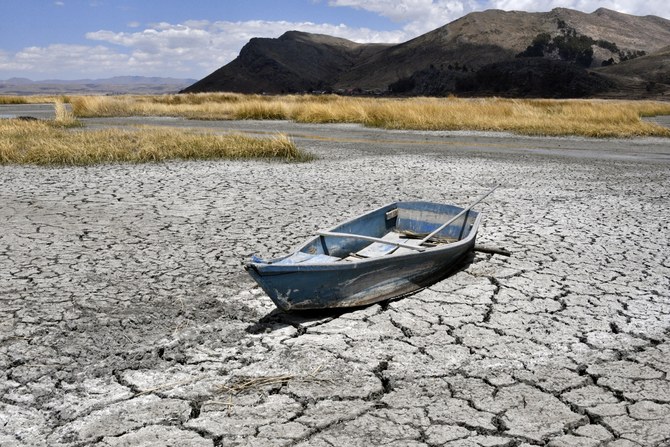How climate change endangers global trade

https://arab.news/4zrbw
As we approach the beginning of the much-anticipated 28th UN Climate Change Conference, known as COP28, which will be held in Dubai from Nov. 30, we must yet again bring into sharper focus the risks posed by climate change, particularly to international trade. It is no secret that runaway climate change has the potential to disrupt global trade significantly, affecting supply chains both directly and indirectly.
This is no distant threat — it is already happening. Extensive research and forecasts have consistently demonstrated the cascading domino effect on trade precipitated by rising global temperatures. Extreme weather disrupts supply chains, damages transport infrastructure crucial for trade, restricts travel and remodels patterns of comparative advantage. The effects can be especially devastating for regions that are heavily reliant on climate-vulnerable sectors, such as the Maghreb.
We are already seeing a preview of a few of these disruptions elsewhere, as the world’s economic machinery — long buoyed by the transnational exchange of goods and services — finds itself in peril. The Panama Canal, a linchpin in maritime commerce that handles about 6 percent of global maritime trade, is beleaguered by falling water levels due to changes in precipitation patterns and droughts. Thousands of miles away, China’s Yangtze River, another critical trade artery, confronts similar disruptions. The ripple effects of these events are keenly felt in Asia, Europe and North America, delaying trade flows and pushing the cost of doing business even higher.
The world has so far been slow to respond to these challenges, all but ensuring a slow-onset catastrophe will unfold
Hafed Al-Ghwell
The world has so far been slow to respond to these immediate challenges, all but ensuring a slow-onset catastrophe will unfold. It is not just the threat of rising sea levels or receding rivers that are threatening maritime ports, which are the very lifeblood of global trade. For instance, the ports of Shanghai and Ningbo experience disruptions for five to six days each year on average owing to extreme wind conditions. Adverse weather patterns are no mere isolated events with no connection whatsoever. These are the very systemic impacts experts, scholars and researchers have warned about in recent decades. Today, every dollar of disrupted trade at, for instance, the Los Angeles and Long Beach ports potentially adds up to $3 in extra costs that are felt through domestic supply chains.
Given the interconnectedness of global trade via these amalgamated value chains, disruptions at key nodes reverberate throughout the world. Extreme weather events and slow-onset impacts, including rising sea levels, pose serious risks to the entire supply chain and transport infrastructure, including ports and crucial shipping hubs. This factor becomes particularly potent for the Maghreb region, an often-dismissed yet still vital piece in the international trade puzzle. Agriculture, manufacturing and tourism — fundamental parts of the subregion’s economic fabric — are the most vulnerable to the direct and indirect impacts of a warming planet. Heatwaves degrade land, droughts affect agricultural output and increased temperatures can hamper manufacturing.
The consequential shifts or losses in productivity then lead to substantial changes in trading patterns, with countries becoming less competitive or losing their comparative advantage in certain products, impacting exports. In addition, rising sea levels and frequent extreme weather events destroy port infrastructure, disrupting the same seaborne trade routes that bring in vital imports, including basic staples.
Moreover, Algeria and Libya are significant exporters of energy resources, such as natural gas. Thus, any climate change-related disruptions to in-land infrastructure or seaborne transportation could affect their ability to maintain stable supply chains, impacting their economies and global energy markets. The resulting heightened socioeconomic distress will then fuel more instability as economies shrink and currencies tumble, sending unemployment rates skyrocketing, adding unsustainable pressure to tattered safety nets and leading to desperate publics turning to populist demagogues or even extremism.
To the Maghreb, what may be a source of alarm or area of mere scholarly curiosity in some parts of the world constitute an existential, multidimensional threat that even its most resource-endowed countries cannot unilaterally confront. Algeria and Libya aside, for agricultural exporters like Tunisia and Morocco, farmers are already weathering desertification, droughts and intensifying water scarcity. Without intervention, these agricultural sectors will suffer more significant disruptions in output, increasing reliance on staple imports to shore up food security.
Even if each Maghreb country was well prepared, more is needed to blunt the economic impacts of runaway climate change
Hafed Al-Ghwell
The combination of growing aridity, high food and water insecurity, instability, weak regional integration and the cumulative impacts of climate change-related disruptions to global trade creates a perfect storm. As one of the least-integrated regions in the world due to its peculiar geopolitics and restrictive economic policies, even if each Maghreb country was individually well prepared, more is needed to blunt the economic impacts of runaway climate change. Rising temperatures will obstruct regional trade, as limited as it is, and heighten the region’s socioeconomic tensions.
The future, however, is not shackled to this narrative. Active, evidence-based interventions and robust policies could steer North Africa toward climate resilience and economic prosperity. As noted by the Wilson Center, regional cooperation, shared water management and inclusive governance are pivotal in mitigating the implications of climate change and developing the resilience needed.
Consider, for instance, the promotion of green economies, addressing the water-energy-food nexus, diversifying income sources and reinforcing social safety nets. By incentivizing sustainable agricultural practices and advancing renewable energy, the Maghreb could address both climatic and economic challenges. Greater emphasis should be placed on climate-smart technologies and practices capable of protecting essential sectors like agriculture, while creating employment opportunities and ensuring regional economic stability. Effective policies that foster regional integration are equally crucial, stressing collaborative efforts and removing barriers hindering intraregional trade. Strong institutional frameworks can materialize these objectives, leveraging the potential of the demographic dividend in the region.
To conclude, while it may seem a distant threat, disruptions to global trade due to climate change will add another layer to North Africa’s existing vulnerabilities. However, the Maghreb can balance economic growth, intraregional trade and climate stability with effective policy interventions from regional cooperation and sustainable economic models. The clock is ticking, warranting swift, effective actions. The Maghreb need not remain entangled in this climate-economic dilemma, provided the rest of the world realizes its collective resilience is only as strong as its weakest link.
COP28 is the next opportunity for the world to acknowledge, demonstrate its intent and address the pressing issue of climate change and its profound impact on global trade. We must rally together to implement policies and strategies that mitigate these risks, enhance resilience and foster a transition toward a more sustainable, climate-proof global trade system.
The time to act is now.
- Hafed Al-Ghwell is a senior fellow and executive director of the North Africa Initiative at the Foreign Policy Institute of the Johns Hopkins University School of Advanced International Studies in Washington DC. X: @HafedAlGhwell










































